Chromium is a trace element that plays an important role in regulating your body’s metabolism and blood chemistry.
It can be taken in supplemental form to lower cholesterol levels, control symptoms of type two diabetes, and promote weight loss.
It’s also popular among bodybuilders for its reputed benefits for dropping fat and increasing strength. More isn’t always better when it comes to chromium—to get the best results, you want a supplement that’s got the right dose of chromium in a form that’s easily absorbed.
Our researchers have ranked the ten most effective chromium supplements available that stand the best chance of improving your metabolic profile and therefore your health.
Research
Rankings
1. Solaray GTF Chromium
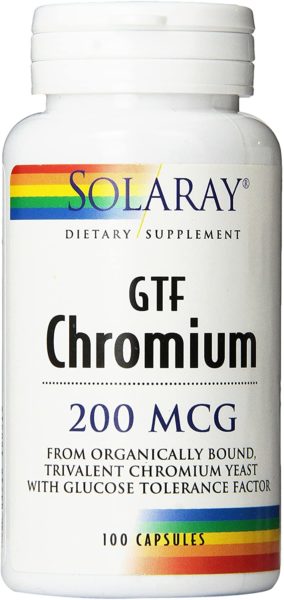
Solaray GTF Chromium is a moderate-dose chromium supplement that uses a natural source of chromium to make it both more biologically available and more successful at regulating blood glucose. The “GTF” stands for glucose tolerance factor.
The chromium is derived from specially-selected yeast, and the company claims that this form of chromium is particularly suited for regulating blood glucose.
As such, this supplement is a great choice if you want to control blood sugar, but may not be as well-suited for the other uses of chromium.
The 200 mcg dose makes it easy to adjust your intake to make sure you stay in the optimal chromium intake range.
2. NOW Tri-Chromium
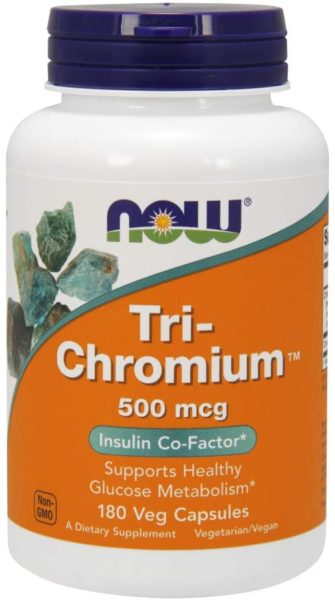
NOW Tri-Chromium includes four different sources of chromium: chromium picolinate, chromium chelavite, chromium amino acid chelate, and chromium polynicotinate.
The supplement also includes cinnamon bark extract, which may beneficially interact with chromium. The varied sources of chromium are good for absorption and bioavailability, though they also make it a little tricky if you are trying to follow the same protocol as scientific studies (those usually use just one source of chromium).
The dosage, 500 mcg per capsule, is on the high side, so it’s well-suited for people who know they have low chromium intake.
3. Solgar Chromium Picolinate
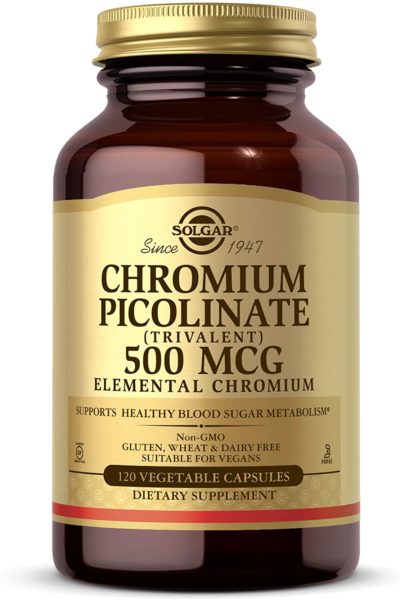
If you want a straightforward chromium supplement in a high dose, this should be your choice.
The 500 mcg capsules use chromium picolinate as their chromium source, and the only other ingredients are cellulose and magnesium stearate to hold the capsules together.
4. Thorne Research Chromium Picolinate
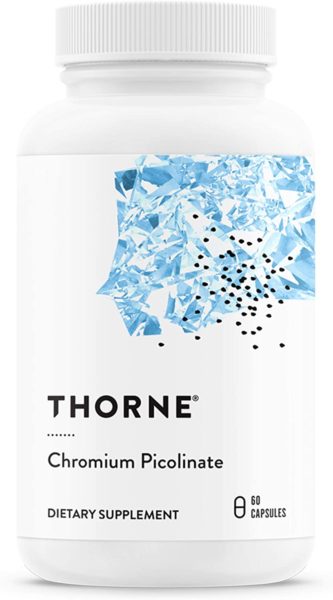
Thorne Research makes a fairly high dose chromium supplement based on chromium picolinate. It’s got 500 mcg of chromium per capsule, and is pretty clean from a supplement design perspective.
It’s a pretty solid all-around choice if you know you’re looking for a higher-dose picolinate-based chromium source, like many scientific studies use.
5. Pure Encapsulations ChroMate GTF 600
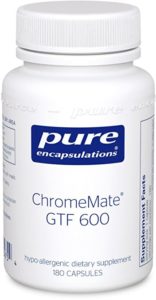
Pure Encapsulations makes a chromium polynicotinate supplement intended for optimal blood glucose control. At 600 mcg per capsule, it’s a strong dosage, meant for people who need to dramatically boost their chromium intake.
If the usual chromium picolinate protocol isn’t working for you, this could be a better option.
6. Superior Labs Chromium Polynicotinate + B
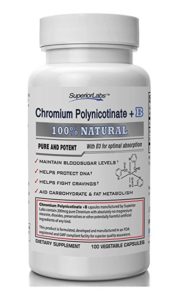
Superior Labs uses a less-common form of chromium, chromium polynicotinate, as its chromium source, and it includes vitamin B3 as well to boost absorption.
At 200 mcg per capsule, it’s a more moderate dose, making it a good choice for people who don’t need as much additional chromium in their diet. It’s well-suited for people who need chromium but don’t tolerate chromium picolinate.
7. Nature’s Bounty Chromium Picolinate
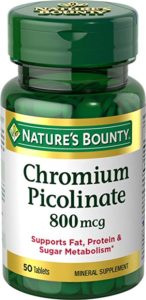
Nature’s Bounty offers a very high dose chromium picolinate supplement with 800 mcg per capsule. For most people, this is too much—chromium is not a supplement where greater intake is always better.
As is sometimes the case with this brand, this supplement has a few extra additives you won’t find in some of its competitors, like dicalcium phosphate and silicon dioxide. It should only be a candidate if you know you need a very high dose of chromium.
8. Best Naturals Chromium Picolinate
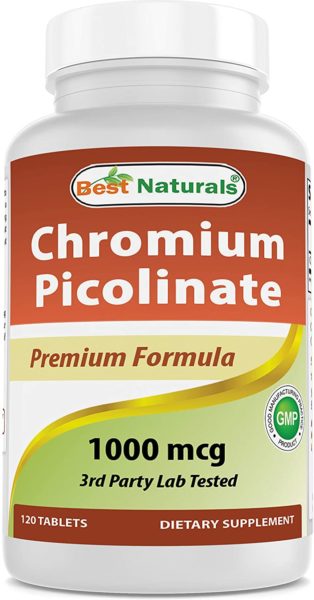
Best Naturals provides a solid supplement to assist with carbohydrate metabolism using 1000mcg of chromium picolinate per tablet.
With no additional colors, flavor or sweeteners in this supplement. Simple product, but effective.
9. Amazing Formulas Chromium Picolinate
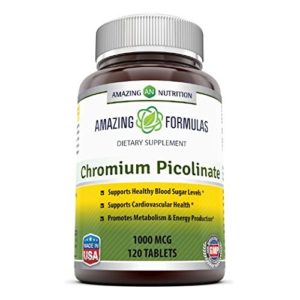
Amazing Formulas has the highest dose chromium supplement on the market, at 1000 mcg per tablet. There are a number of other binders and additives, but the barrier for most people is going to be simply the high dose.
One thousand micrograms is on the high side for just about everybody, so you should only go for this supplement if you are confident you need the high dosage.
10. Sensible Supplements Chromium
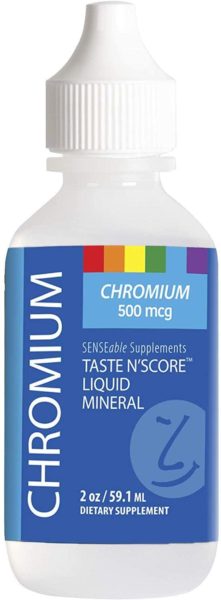
Sensible Supplements uses chromium ascorbate as a source of water-soluble chromium, dissolved into a solution and administered in drop form from the dropper bottle.
While this is a very convenient way to add chromium to a smoothie, shake, or drink, measuring droplets is a lot less accurate than dosing from a tablet, where you know precisely how much chromium you are getting.
Though each drop only has about 30 mcg of chromium, there is still a considerable margin of error when it comes to measuring out doses.
Given how important it is to stay within the optimal dosage range, you’d need a good reason to opt for this chromium supplement over a tablet-based supplement.
Category winners
Best chromium overall: Solaray GTF Chromium
Solaray GTF Chromium provides trivalent chromium from naturally-sourced yeast at a solid but not excessive dose of 200 mcg. Because of these strengths, it’s our recommendation for general-purpose chromium supplementation.
Best chromium for weight loss: Solaray GTF Chromium
To take advantage of chromium for weight loss, you want to leverage both its direct fat burning benefits and its metabolic health benefits. To control blood sugar while dropping weight, Solaray GTF Chromium is our pick, thanks to its balanced naturally-sourced formulation.
Best chromium for cutting: Thorne Research Chromium Picolinate
In addition to regular people aiming to lose weight, chromium is often used by bodybuilders during cutting phases. The higher dose and potency of Thorne Research Chromium Picolinate is our pick for them, since their focus is moreso on burning fat and less on metabolic health and other ancillary benefits of chromium.
Best chromium for women: Solaray GTF Chromium
Solaray GTF Chromium is great for women because of its moderate dose—especially for women with a smaller frame, some of the higher-dose chromium supplements out there may be too potent. At 200 mcg, Solaray is just right.
Best chromium for metabolic health: Solgar Chromium Picolinate
Chromium’s ability to control blood sugar and improve insulin sensitivity is the topic of a great deal of research, and the simple formulation of Solgar Chromium Picolinate is the best way to capitalize on these potential benefits. With 500 mcg of chromium in a simple capsule, it should be your first pick for sustaining metabolic health.
Best chromium for hunger cravings: NOW Tri-Chromium
NOW Tri-Chromium provides a potent 500 mcg dose of chromium from three different sources. It’s the best supplement for following the latest research protocols that have used high doses of chromium to suppress hunger cravings during periods of weight loss.
Who should buy chromium?
Chromium is a trace mineral that plays a role in your body’s metabolic functioning. It contributes to the function of insulin and the maintenance of energy balance in your body. In certain forms, chromium has found applications as a supplement for weight loss and as an ingredient in supplements for athletes.
These potential applications are surprisingly closely linked—insulin not only controls how your body reacts to increases and decreases in carbohydrate availability, but it also influences your growth of muscle tissue. Because of its potential link to insulin, chromium has also been explored as a possible adjunctive treatment for diabetes and metabolic syndrome.
One of the reasons chromium is less well-known than some of the other natural weight loss supplements and pre or post-workout supplements is that it is more of an experimental supplement.
Only a few studies have specifically examined the benefits of chromium in a rigorous way; most of what we know about chromium is either from small randomized studies or from more basic biological investigations that study the cellular effects of chromium in animal models or cells in a Petri dish.
Nevertheless, if you have been unhappy with your fat cutting supplements to date, and are looking for a supplement that’s a bit off the beaten path, chromium might be something worth a try. While it’s not for everyone, it does have a few potentially useful niche applications that have to do with the specific biochemistry of trace elements in your body.
How we ranked
With relatively little in the way of large scientific studies on precise chromium usage for optimal weight loss or exercise benefits, we based our evaluation of the options for chromium on the market on the specific chemical type of chromium they delivered, their dosage, and the purity and overall quality of the supplement design.
We were looking for sources of chromium that are biologically available and easily absorbed. So, we sought out supplements that used chromium picolinate, and potentially other bioavailable forms of chromium.
Chromium picolinate has been the most-studied form of chromium to date, and perhaps the strongest evidence for the efficacy of chromium comes from studies that used chromium picolinate.
However, it’s not the only form of chromium. Chromium can also be bound up in amino acid chelates, which can help chromium get absorbed into your body more easily. We eliminated from consideration any of the chromium products on the market that did not use chromium picolinate or another highly bioavailable form of chromium.
Our research team was also not interested in supplements that used chromium alongside other ingredients. While chromium is a popular ingredient in thermogenics, fat burners for women, and other supplements targeting fat loss or muscle gain, if you are specifically looking for a chromium supplement, you want it in isolation.
Additionally, almost all of the clinical research on chromium has focused on its use in isolation, not when combined with other supplements.
While thermogenics and fat burners may be more effective if they have chromium, it will be hard to tell if chromium is directly responsible for the benefits you experience. As such, for our chromium rankings, we eliminated any supplements that did not exclusively supply chromium.
When it came to supplement design and overall quality, we looked for markers of excellence like following good manufacturing processes, having independent lab testing for purity, and avoiding unnecessary ingredients like binders, fillers, and stabilizers.
The top performing chromium supplements were those that delivered a dose of chromium that was in line with what’s been tested in the scientific research thus far, and that did so without any unnecessary filler ingredients. The remaining products represent the best options for chromium available right now.
Benefits
Chromium is a rare but essential mineral. Chromium is an essential mineral that’s plays a vital role in regulating glucose metabolism and enhancing the action of insulin, a hormone critical to the metabolism and storage of carbohydrate, fat and protein in the body.
It is sometimes supplemented to improve insulin action in the body (1).
It’s classified as a trace mineral because tiny amounts are required for good health. Chromium is found in various foods (meat, whole-grain products, some fruits, vegetables and spices) 2.
While reports of actual chromium deficiency in humans are rare, people with mild chromium deficiency may benefit from chromium supplementation.
Suboptimal levels of chromium may be attributed to diets high in simple sugars which have been shown to increase chromium elimination from the body through urine output (3).
Other factors that may cause low chromium levels include infection, strenuous exercise, pregnancy and lactation, and physical trauma.
There are some reports showing a link between chromium insufficiency and older adults (4). The presence of chromium in the body is difficult to determine, however, because blood, urine and hair do not necessarily reflect the accurate amount.
Supplementation of chromium is not without controversy. Since chromium influences insulin action and glucose metabolism, researchers theorize that chromium supplementation is a logical candidate for diabetes treatment. However, studies have yielded conflicting results.
According to the American Diabetes Association, results from some trials have indicated that chromium supplementation improves glucose metabolism and the serum lipid profile in patients with or without diabetes. In contrast, they have found that results from other studies have indicated little or no benefit of chromium on any of these variables (5).
Studies show chromium’s potential in also helping to raise HDL (“good”) cholesterol levels, and may play a role in preventing heart disease.
More research is needed to determine the full range of its roles in the body and proper supplementation and safety guidelines.
Chromium’s main mechanism is believed to be directly tied to chromodulin. Chromodulin, a protein, plays a role in insulin signaling and chromium transport. If this protein is impaired, insulin’s ability to work in the body is greatly affected (6).
Chromium supplements might help to control type 2 diabetes. In 2015, authors of a study published in the Journal of Nutrition, evaluated the use and potential benefits of chromium supplementation in type 2 diabetes by examining data from the National Health and Nutrition Examination Survey.
They concluded that the odds of having type 2 diabetes were lower in persons who consumed chromium-containing supplements than in those who did not (7).
In a 2002 study, researchers assessed the effect of chromium administration (twice daily) on glycemic control and lipid profile in 50 type 2 diabetic volunteers. The study lasted 12 weeks with a four-week wash-off period in between.
Significant improvement in glycemic control was noted in the chromium-treated group compared to the placebo group, accompanied by a significant greater fall in fasting serum insulin.
The change in lipid parameters (total serum cholesterol, high density lipoprotein cholesterol, low density lipoprotein cholesterol and triglycerides) did not show significant difference between the chromium and placebo groups.
Researchers believe the improved glycemic control in the type 2 diabetic participants appears to be due to an increase in insulin action rather than stimulation of insulin secretion (8).
As previously mentioned, there are studies that fail to show an effect in chromium in treating diabetes. In one such study, 26 elderly patients with persistent impaired glucose tolerance were randomly treated either with chromium-rich yeast (160 micrograms daily) or with placebo for six months.
The results of the study showed no significant change observed in the oral glucose tolerance test, and glycosylated hemoglobin and plasma insulin levels remained unchanged (9).
In a 2013 meta-analysis review of randomized trials, the effect of chromium supplementation versus placebo on glucose and lipid profiles in patients with type 2 diabetes was analyzed.
Researchers specifically focused on randomized clinical trials with intake of chromium in dosages higher than 250 micrograms for at least three months.
It was concluded that chromium lowers fasting blood sugar but does not affect glycated hemoglobin (HbA1c), lipids and body mass index (10).
Some experts suggest that conflicting results among these and several other studies may be due in part to the different forms of chromium used in the studies. Different forms range from brewer’s yeast to glucose tolerance factor (an organic form of chromium extracted from brewer’s yeast), to chromium picolinate (a form of chromium) and chromium chloride (11).
Doses have also varied and many of the studies have been short-term studies. The need for long-term, intricate and larger studies is warranted.
Chromium may help treat gestational diabetes. A 1999 study evaluated the effects of chromium supplementation in 30 gestational diabetic women (20–24 week of pregnancy).
Ten received 4 micrograms/kg/body weight daily of chromium picolinate, 10 received 8 micrograms/kg/body weight daily of chromium picolinate and 10 received placebo.
At baseline, the three groups did not differ for insulin, C‐peptide or glucose levels at the fasting and one hour time point after the 100 g oral glucose challenge test.
After 8 weeks, the two chromium‐supplemented groups had significantly lower glucose and insulin levels compared to their baseline levels and to those of the placebo group; the 8 microgram group had significantly lower postprandial glucose levels than the 4 microgram group (12).
Chromium may have a cardioprotective effect. The results of a study published in the American Heart Journal revealed that short-term chromium supplementation shortens QTc interval duration in type 2 diabetic patients.
According to the Mayo Clinic, long QTc interval syndrome is a heart rhythm condition that can cause fast, chaotic heartbeats. These rapid heartbeats might trigger a sudden fainting spell or seizure. In some cases, the heart can beat erratically for so long that it causes sudden death (13,14).
There is some evidence that low levels of chromium may be a possible risk factor for cardiovascular disease. And according to The Heart Institute, since mild impairment of blood sugar control is believed to increase risk of heart disease, chromium supplementation might help reduce heart disease rates (15).
In 2005, researchers set out to determine whether low chromium concentrations were associated with risk of nonfatal myocardial infarction. They measured the level of chromium concentrations in the toenails of participants aged 70 years and younger.
Their study revealed that intake of chromium-containing foods may be inversely related to the risk of nonfatal myocardial infarction, and supports the growing body of evidence pointing to the importance of chromium for cardiovascular health (16).
The aim of a 2005 study was to evaluate the impact of chromium picolinate supplementation on blood pressure, vascular reactivity and myocardial ischemia-reperfusion injury in rats.
Myocardial ischemia is a condition in which there is a severe impairment in blood flow to the heart, typically as a result of a partial or complete blockage of the coronary arteries.
Complications include damage to the heart, abnormal heart rhythms and even a heart attack (17). Timely reperfusion can salvage significant amounts of myocardium and extend the window of myocardial viability.
Supplementation of 10 mg chromium/kg diet for six weeks did not affect blood pressure or vascular smooth muscle reactivity. However, treatment did cause an enhancement of endothelium-dependent vasorelaxation associated with nitric oxide production/release.
Additionally, while the treatment did not affect infarct size, it improved functional recovery of the viable portion of the myocardium following ischemia-reperfusion injury (18).
Chromium may raise HDL cholesterol. While studies show that supplementation of chromium does not lower LDL (bad) cholesterol or triglycerides, some studies show that it may actually play a positive role by raising HDL (good) cholesterol.
According to Harvard Men’s Health Watch, a 1991 study of 63 men found that chromium supplement could boost HDL levels by 16 percent. Other studies of chromium and HDL, however, have produced mixed results (19). More research is needed to better understand the role of chromium in raising HDL cholesterol.
Chromium may play a role in treating polycystic ovarian syndrome. The goal of a study published in The Journal of Obstetrics and Gynaecology Research, was to investigate the effect of chromium picolinate on insulin resistance in polycystic ovary syndrome (PCOS).
PCOS is a hormonal disorder that affects approximately 11 to 18 percent of reproductive-age women (20). Common symptoms include irregular periods, excess androgen and polycystic ovaries (21).
Insulin resistance and the resultant hyperinsulinemia are key metabolic features of PCOS.
Eighty-five patients took part in the study and were randomly assigned to six months of 1000 micrograms of chromium picolinate or placebo capsules.
At the conclusion of the study, chromium was associated with significant reduction of body mass index and a significant rise in fasting glucose insulin ratio. Supplementation also significantly increased the chances of ovulation and regular menstruation by almost twofold after the fifth month of treatment (22).
Chromium may reduce hunger cravings. In 2008, researchers assessed the effect of chromium picolinate in reducing food intake in healthy, overweight, adult women who reported craving carbohydrates.
Utilizing a double-blind placebo-controlled design, researchers randomly assigned 42 women to receive 1,000 mg of chromium or placebo for eight weeks. Food intake at breakfast, lunch and dinner was measured at baseline, week one and week eight.
Results were promising: when compared to placebo, chromium supplementation reduced food intake, hunger levels, fat cravings and tended to decrease body weight (23).
Another study showed the benefits of chromium on binge eating disorder. There are several psychological factors that can cause this disorder, including depression, stress and anxiety. Binge eating may also result from fluctuations in blood glucose levels from eating high carb foods (24).
According to the National Eating Disorders Association, binge eating disorder “is a severe, life-threatening, and treatable eating disorder characterized by recurrent episodes of eating large quantities of food.” (25)
Twenty-four overweight adults with binge eating disorder took part in a six-month double-blind placebo-controlled trial and randomly assigned to receive 600mcg or 1000mcg of chromium or placebo daily.
At the end of the study, researchers noted that fasting glucose was significantly reduced in both chromium groups compared to the placebo group. In addition, there were reductions in binge frequency, weight and depression in those treated with chromium versus placebo (26).
Side effects
While side effects associated with chromium appear to be rare, excess chromium consumption may cause problems (27).
There is one report of kidney, liver and bone marrow damage in a person who took 1,200 mcg to 2,400 mcg of chromium for several months; in another report, as little as 600 mcg for six weeks was enough to cause damage.
Researchers note that these adverse reactions are extremely rare, and may be attributed to these individuals having other health problems that predisposed them to such adverse reactions.
There are also several concerns about the picolinate form of chromium altering levels of neurotransmitters. Experts warn that supplementation should not be taken by individuals with depression, bipolar disorder or schizophrenia without first consulting with a treating physician.
Certain medications may interact with chromium supplementation. These include beta-blockers, corticosteroids, insulin and NSAIDS (28).
The maximum safe dosage of chromium for women who are pregnant or nursing and for those with severe liver or kidney disease has not been established.
Recommended dosage
The U.S. National Academy of Sciences has established the Recommended Daily Allowances for chromium as 50–200 micrograms daily for adult men and women (29).
Due to possible health concerns and side effects, however, it is best to first consult with a medical professional before taking chromium supplementation.
FAQ
Q: What does chromium do to your body?
A: Chromium is a trace mineral, which means it is only present in very small amounts in your body, but that doesn’t mean it does not fulfil an important role. Looking at chromium deficiency provides an informative look at the functions that chromium provides.
People who don’t have enough chromium have problems with glucose metabolism, meaning their body can’t process blood sugar for energy in the right way. This finding motivated research into whether chromium supplementation might help with diabetes, metabolic syndrome, or weight loss.
Beyond glucose metabolism, chromium may play a role in processing fats in your body (hence another connection to weight loss), but it does not have the same kind of broad-spectrum uses in your body like other trace minerals such as zinc or iron.
Q: Does chromium help with weight loss?
A: Because of the connection with lipid metabolism and glucose processing, many people have hypothesized that there is a connection between chromium and weight.
As such, you’ll find chromium is many different weight loss supplements, though the evidence for its efficacy is relatively limited. According to a review article on trace minerals and athletic performance by Henry Lukaski, published in the Canadian Journal of Applied Physiology, a few studies have found success using chromium for weight loss or muscle gain, though at least as many have not found any significant effects from chromium supplementation (30).
Many people report that chromium has helped them with weight loss, but in most cases people taking a chromium supplement are also doing other things for weight loss, like eating better, exercising, or taking other supplements as well, so it’s hard to pin the benefits squarely on chromium.
Q: What are the symptoms of chromium deficiency?
A: Chromium deficiency is extremely rare, but is characterized by dysregulated weight maintenance as well as blood sugar or insulin problems.
The biological functions of chromium were first identified in patients who were on long-term parenteral nutrition, which is when doctors have to deliver nutrients directly into your bloodstream as opposed to through your digestive tract. When chromium was not added to parenteral nutrition packs, patients developed glucose metabolism problems.
This finding is what spurred interest in supplemental chromium, but the fact remains that chromium deficiency is extraordinarily rare outside of people on parenteral nutrition.
Q: Why is chromium added to a cinnamon supplement?
A: Chromium is often found in conjunction with cinnamon largely thanks to a well-done study published in 2015 that showed significant benefits of these two compounds in people who are obese and diabetic.
The study, published in the journal PLoS ONE, showed that a combination of cinnamon and chromium supplementation increased fat-free mass (i.e. muscle and bone mass) among people who were obese and had diabetes (31).
More importantly from a medical perspective, their fasting blood sugar significantly decreased when compared to a group of people who were given a placebo supplement and followed for the same amount of time. The success of this study spurred several later citations, as well as many supplements attempting to capitalize on the success of this formulation for weight loss and for managing diabetes.
As with any supplementation routine for people with a chronic medical condition, you should talk to your doctor first before you supplement, especially if you are taking medication at the same time to manage diabetes.
Q: What foods are high in chromium?
A: Foods like beans, broccoli, barley, and oats are high in chromium—essentially, the same kind of leafy greens, legumes, and whole grains that you would expect to be high in fiber, iron, magnesium, and other important micronutrients.
The availability of chromium in many healthy foods might have something to do with why chromium deficiency is so rare among people eating standard diets.
The chromium in these foods comes from the soil; along with other trace minerals like copper, chromium is absorbed through plant roots and makes its way through the plant. So, a diet high in naturally sourced foods and low in ultra-processed foods is a good way to get plenty of chromium, as well as other trace elements, in your diet.
Q: Does chromium picolinate pose a danger to your health?
A: With the popularization of chromium supplements, some doctors are worried about potential health threats from chromium picolinate. Some of these worries come from the fact that chromium, when found in its natural metallic form, is extremely toxic.
A case study published in 1998 describes toxicity associated with taking a chromium picolinate supplement that provided about 10 times the recommended amount of intake (32).
The subject of the case study was a woman who presented with weight loss, anemia, and liver and kidney dysfunction, which the doctors attributed to chromium overload from the supplement the woman was taking. As with many other supplements that have not been rigorously studied, it is important not to exceed the recommended dosage if you do decide to take chromium.
Q: What is GTF chromium?
A: GTF chromium stands for glucose tolerance factor chromium, which is derived from nutritional yeast. The hope with GTF chromium is that this biologically active form will be more readily absorbed into your body, though the evidence to suggest that it’s more effective than other forms of chromium, like chromium picolinate is scarce.
By analogy, similar amino acid chelate forms of other trace minerals (such as iron) are more effectively absorbed, but most of the research on chromium uses chromium picolinate, not other forms like GTF chromium.
Q: What is a chromium supplement good for?
A: Chromium is popular for a few specific uses. It is used as a weight loss or fat loss supplement, both by people who are overweight and by bodybuilders who are trying to cut fat mass while maintaining lean body mass.
It also has found use as a supplement for managing blood sugar levels in diabetics, sometimes in combination with a cinnamon supplement. As with any supplement that could be used in conjunction with prescription medication, you should talk to your doctor first if you have diabetes and want to try chromium supplementation.
Q: How much chromium is too much?
A: According to government recommendations, you should not exceed 200 micrograms of chromium per day (33). This is the highest level of chromium intake that’s known to be safe for long-term use.
For reference, the highly cited study that used chromium in combination with cinnamon for treating obesity and type two diabetes used a dosage of 125 micrograms of chromium per day, which is within the range of acceptable chromium supplementation dosages. There’s no evidence to suggest that more than the recommended amount of chromium is better for you.
Q: Can chromium be used to manage blood sugar?
A: Part of the reason for chromium’s popularity as a supplement is its role in managing your body’s glucose metabolism. Chromium definitely plays a role in metabolizing blood sugar because your blood glucose gets dysregulated if you are chromium deficient.
Some people think that chromium could be useful for managing blood sugar levels in people who have type two diabetes or metabolic syndrome, though to date, only a handful of small studies have explored the use of chromium.
Nevertheless, one recent study that used chromium alongside cinnamon reported success in lowering fasting blood sugar levels as well as an increase in lean body mass, which are good signs for metabolic health.
Since little is known about potential drug interactions, it is a good idea to talk to your doctor about how your diabetes medication could interact with chromium supplements before you start taking chromium.
Related articles
Recap
Chromium is an essential mineral that’s plays a vital role in regulating glucose metabolism and enhancing the action of insulin.
It is naturally found in some foods and a severe deficiency is rare. Since chromium influences insulin action and glucose metabolism, researchers theorized that chromium supplementation is efficacious for the treatment of diabetes. However, studies have yielded conflicting results.
While some studies show that chromium supplementation improves glucose metabolism and the serum lipid profile in patients with or without diabetes, other studies indicate little to no effect at all.
Much more evidence is needed to understand the role of chromium supplementation in treating diabetes as well as to better understand the potential mechanism of action in treating other conditions.
Chromium is also being studied for its potential cardioprotective effect and ability to raise HDL (good) cholesterol, as well as treat polycystic ovarian syndrome and binge eating disorder.
Due to possible dangerous side effects and interactions with other drugs, it is best to first consult with a medical professional before taking chromium supplementation.
For BodyNutrition’s #1 chromium recommendation, click here.